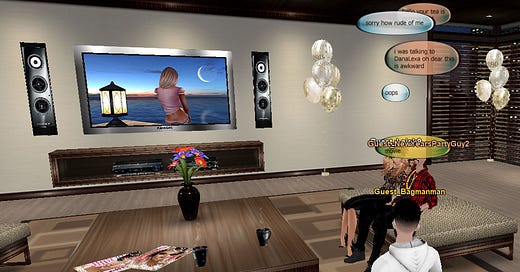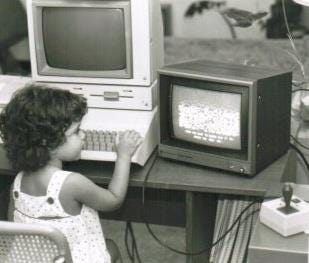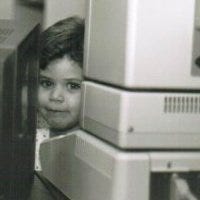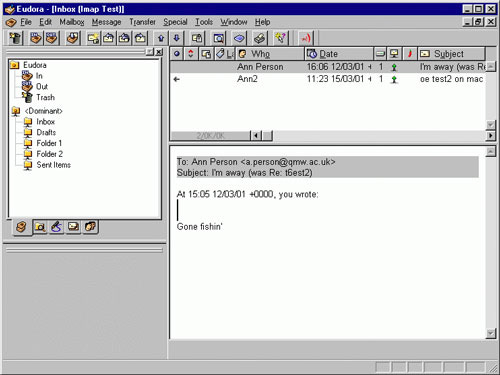Been on computers since little; I made my first internet profile when I was 12 or 13 years old. It was the early 1990s, and I got online via my Dad’s black-and-white Macintosh computer, with all the screams you’d expect from a modem.
The internet was still very new. I didn’t really understand it, but nobody did. There was e-mail and there were message boards (like early Reddit), but no Google yet, no websites, no Web. Even then, it promised a nascent secondary reality, a ‘virtual space’ with its own significant possibilities beyond the world we knew. Choosing my first ‘handle’ was a momentous decision – I was not only deciding what I would call myself, but who I would be in this second world (like any normal adolescent girl, I called myself ‘Delilah’).
Throughout the 90s and early 2000s, the hopeful possibility space of the online world was represented by icons of maps, globes and magnifying glasses; verdant landscapes, cloud-dotted skies. It was practically a real, live alternate dimension, and in our carefully-crafted HTML roleplay profiles on AOL and MySpace, we had real, live alternate selves.
These days the phone is a horror window welded to our palm. We see more internet than reality – so much so that it’s hard to know what is real in the world. And somewhere along the line we lost our sense of virtual space, of possibility, of new reality. How strange to see a star born and die just within my lifetime.
Many of my friends, and many of yours, have announced their exit from social media platforms that have been co-opted by authoritarians toward a new world order. This is a sensible thing to do: Facebook and Twitter (sorry, Meta and X, lol) are owned by fascist billionaires who are explicitly collaborating with the right-wing US regime to control our experience of information! Their policies make their platforms unsafe for vulnerable groups!
Why would anyone support these companies by volunteering content to them for free? Especially when you also get scraped and churned into some corporate AI without your knowledge or consent, deleting your accounts makes eminent sense. I feel inspired by Jaron Lanier’s implication that the world would be a better place without social media, if we’d never had social media – that it’s done more harm than good.
Okay, so what does waxing nostalgic about the internet have to do with a blog about reality TV and game design? Well, in our articles and comments discussions here, we’ve talked about the concept of ‘constructed reality’ – performance spaces with their own rules, where people ‘play’ as outsized versions of themselves. We create avatars in the form of carefully edited selfies and selected images of our homes, clothes and food.
The promised “metaverse” of information superhighways, virtual bodies and 3D homes in ‘online worlds’ ultimately only held longterm relevance to a very passionate niche. Still, a cross the last decade or so, the internet and its social media platforms have become the most significant constructed reality in contemporary life.
We all have internet selves we perform as, and virtual spaces for ourselves that we curate. I’ve had one since I was twelve years old, and I just don’t know how to go back now. If you’ve followed me for any length of time, particularly my work in games and technology journalism, you’ll know that the internet hasn’t been ‘safe’, healthy or unbiased for me or any of my marginalized colleagues probably ever – I saw firsthand the rise of the right and its ‘flood of shit’, as one of the people in the games industry upon whom they first practiced their disinfo war tactics (among other venues, you can see me in the recent Netflix documentary ‘The Antisocial Network’ on this topic). It’s wild to me to hear people say now these platforms have hostile policies; now, when it’s easy, they draw the line.
How can I ‘support’ this shit by staying on social media myself? I’ve never ‘supported’ it; I simply live online, and it’s not in my nature to just leave, to just allow corporations in lockstep with a fascist leadership to ‘have’ this space and all of its implications. What else can they do to me and my concept of the truth that they haven’t already done? How could I ever put that horse back in the barn?
So I’ll never fucking log off, as a personal choice. But the transformation of our content economy and information climate has other implications for our enjoyment of unscripted stories starring real people, or versions of them – whether that’s the platform’s ‘main character of the day’, a content creator on TikTok, or a produced reality show designed to be discussed and shared.
A huge feature of reality shows’ appeal is that social component – a debrief on the relationship values you both watched, an analysis of a contestant’s behavior, predicting together what will happen in the players’ storylines. Without that third space, a key vector of an inherently participatory entertainment format is missing.
That’s why I’ve become so interested in the game designs of reality television – particularly the way these shows are social and interactive by their nature. I’m interested in how I, as a designer, might return this sense of interactivity and shared experience to viewers who are largely binge-watching TV in increasing isolation these days, phone in hand.
When we keep picking up the phone to scroll while the TV’s on, what are we looking for inside this darkening window? What’s missing, and is there a way to restore it by offering innovative ways to curate the self, connect with other viewers and enjoy more engagement with our Stories through playful game design? That’s what I’m here for these days.
The fascists don’t own the concept of Online. The internet has been screaming since it was born.
Thanks for your patience with this article series! The fact is, I became demoralized by the content economy – who writes articles any more? How will I promote them? Can I even think about monetizing? …Content?!
Regardless, regular weekly service resumes now, and I hope you’ll continue to join me. I’ve decided to set up to accept subscriber payments, so if you want to support this design exploration your donations are warmly welcomed – if you don’t have money, because who does right now, sharing my Substack within your network, wherever you nurture it, is just as good for me.
Thanks for keeping it Unreal! Breathing Machine: A Memoir of Computers, my 2018 Thought Catalog ebook on my internet childhood, is still available on Amazon or wherever you get your ebooks. I don’t get any more money from it though, so steal it off Internet Archive for all I care. If you happen to read it, please write to me.









Missed reading these ^^
Welcome back, Leigh